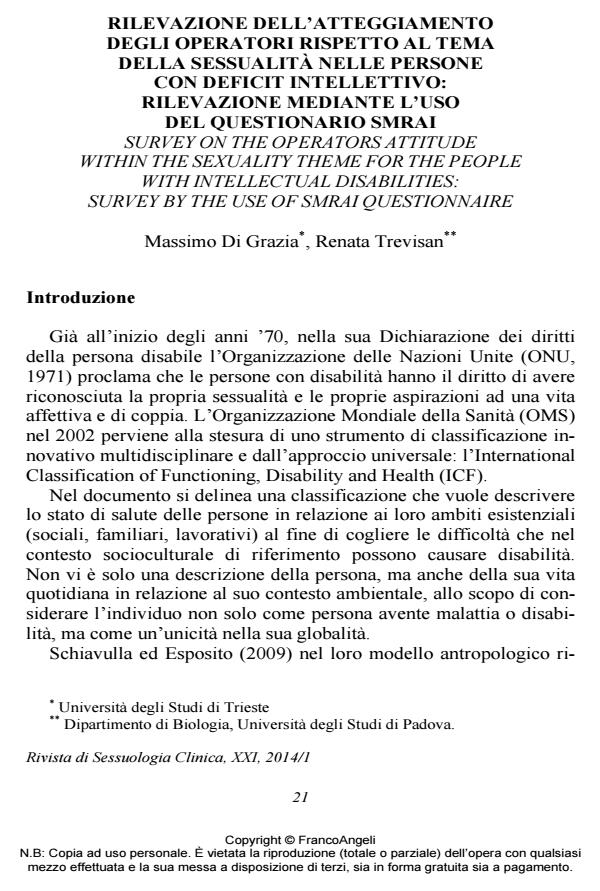Survey on the operators attitude within the sexuality theme for the people with intellectual disabilities: survey by the use of smrai questionnaire
Journal title RIVISTA DI SESSUOLOGIA CLINICA
Author/s Massimo Di Grazia, Renata Trevisan
Publishing Year 2014 Issue 2014/1
Language Italian Pages 23 P. 21-43 File size 124 KB
DOI 10.3280/RSC2014-001002
DOI is like a bar code for intellectual property: to have more infomation
click here
Below, you can see the article first page
If you want to buy this article in PDF format, you can do it, following the instructions to buy download credits

FrancoAngeli is member of Publishers International Linking Association, Inc (PILA), a not-for-profit association which run the CrossRef service enabling links to and from online scholarly content.
This study focuses on the sexuality and affectivity of people with intellectual disabilities. On account of this, the view of the health operators working in the communities taking care of the ID patients has been evaluated. The typology of the communities involved in this study shows different organization aspects and an heterogeneity of the ID pathologies of the patients. The investigation tool used for the operators is the SMRAI questionnaire. Our results provided evidence that there is a lack of the specific affective/sexual education and of the capacity to face the personal behaviours that compares and contrasts the operators with own qualities and culture, considering bioethical point of view.
Keywords: Intellectual disables, sexuality/affectivity, adulthood, operators, training, SMRAI, bioethics.
- Investimenti Diretti Esteri E Scambi Internazionali Di Servizi: UnnAnalisi Basata Sui Microdati Della Bilancia Dei Pagamenti (Foreign Direct Investment and International Trade in Services: An Analysis Based on Balance of Payments Microdata) Chiara Bentivogli, Francesco Bripi, Luca Cherubini, Eleonora Laurenza, Paola Monti, Elisabetta Nencioni, Valeria Pellegrini, in SSRN Electronic Journal /2016
DOI: 10.2139/ssrn.2772545
Massimo Di Grazia, Renata Trevisan, Rilevazione dell’atteggiamento degli operatori rispetto al tema della sessualità nelle persone con deficit intellettivo: rilevazione mediante l’uso del questionario smrai in "RIVISTA DI SESSUOLOGIA CLINICA" 1/2014, pp 21-43, DOI: 10.3280/RSC2014-001002